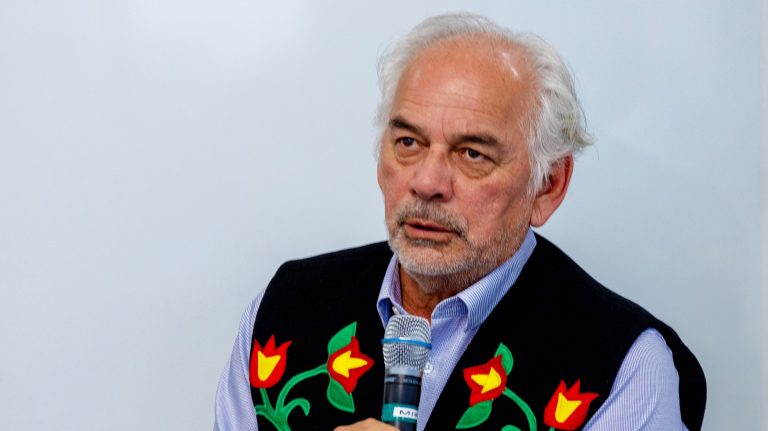‘With patience, perseverance, and commitment, we can make ourselves heard’

Writer Kassidy Jacobs (Kanien’kehá:ka, Kahnawake) is a third-year undergraduate student in journalism and First Peoples Studies.
After more than three decades at the forefront of the Assembly of First Nations Quebec-Labrador (AFNQL), Regional Chief and Concordia expert-in-residence Ghislain Picard Ghislain Picard announced earlier this year that he would not seek another mandate.
Indigenous History Month presents an opportunity to reflect on Picard’s legacy and the impact of his 33 years of service.
A career rooted in amplifying Indigenous voices
Born in the Innu community of Pessamit, just north of the St. Lawrence River in Quebec, Picard began his path to advocacy through journalism. He wrote for his nation’s local newspaper and the radio station he co-founded, the Société de communication Atikamekw-Montagnais.
Through this early work, he recognized that information on Indigenous issues was scarce and often inaccessible, particularly in remote communities like his.
“I came from a nation that was isolated. Not many could freely communicate their concerns, and opinions,” Picard says. “I thought, this can’t be, I have to provide space for my people to be able to express themselves.”
Picard worked as both a representative and negotiator for the Council of the Atikamekw and Montagnais before he decided to make the jump to regional chief of the AFNQL in 1992. He says his primary focus was on advancing reconciliation with the Canadian government, while resisting the pressures of colonialism.
He describes these systemic issues as deep-rooted, noting that Indigenous peoples were never meant to fit within a framework designed to erase their identities, cultures, and languages.
“We need to accept the reality that were never meant to be in the original colonial framework,” he says, “But with patience, perseverance, and commitment, we can make ourselves heard.”
Reconciliation beyond symbolism
Today, he says, the conversation must go beyond symbolic gestures. With urgent challenges like access to clean drinking water and safe housing still unresolved, Picard stresses the need to keep these issues at the forefront of the federal agenda.
“You have your ship, we have our canoe — we have to respect each other’s very different realities and cultures,” he says. “But at the same time, it’s important that we stay defensive and make sure that Indigenous issues remain on the government’s radar.”
One of his most notable achievements came in 2006, when he successfully mobilized then-Quebec Premier Jean Charest and his government to engage directly with the AFNQL.
Over the course of a three-day meeting, Picard and his committee outlined key concerns and proposed concrete changes aimed at improving conditions in their communities. The Quebec cabinet responded with ideas on how to resolve these issues.
“That was a big moment for me,” he says. “It really set the course for creating more allies and helped raise the profile for our communities from an economic and social point of view.”
A Concordia expert-in-residence
Since September 2023, Picard has served as Indigenous Governance Expert-in-Residence at Concordia with Geoffrey Kelley, a long-serving Member of the National Assembly of Quebec. Both have been welcomed into the Department of Political Science under a two-year mandate, where they co-teach two graduate-level classes, which explore political and administrative issues that arise in relations between Indigenous peoples and the state.
“Chief Picard brings to the classroom unparalleled insights and expertise not only on questions of Indigenous governance, but also on issues related to the functioning and structure of the state in Quebec and Canada,” says Daniel Salée, department chair.
As an expert-in-residence, Picard also serves as a resource for professors and as a mentor for students.
“We are extremely grateful for his willingness to share his knowledge with students and faculty. His work with us considerably enriches the training and education we offer our graduate students competing for employment in the public sector and advocacy organizations.”
A new chapter
As the longtime advocate prepares for a new chapter, his departure marks the end of a significant era in Indigenous leadership. Picard says that he’s leaving the AFNQL on great terms and feels confident that the grassroots movement is in capable hands.
He also shared that, while he remains in good health, he’s ready to explore and contribute to new paths and opportunities.
In April, Picard was appointed adjunct professor at HEC Montréal, where he has been collaborating since 2021 on First Nations Executive Education (FNEE). The project offers Indigenous leaders training to help promote self-determination and improve socio-economic conditions in their communities.
When asked what advice he would give to his successor as regional chief, Picard stressed the value of remaining humble and having a good listening ear.
“What’s going to make good leadership is someone who listens more than they talk. You have to be able to really listen, observe and analyze the situations you’re dealing with.”
Learn more about Concordia’s Department of Political Science.




